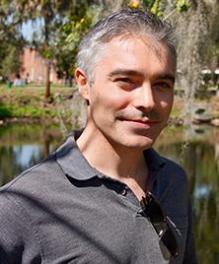 Andrew J. MacIntosh, Ph.D.
Andrew J. MacIntosh, Ph.D.
Assistant Professor - Food Science
Office: AFFP 126
Phone: 352.294.3594
Email: andrewmacintosh@ufl.edu
 Andrew J. MacIntosh, Ph.D.
Andrew J. MacIntosh, Ph.D.Office: AFFP 126
Phone: 352.294.3594
Email: andrewmacintosh@ufl.edu
After working in the manufacturing industry as a departmental engineer Dr. MacIntosh transitioned to academia to complete a masters degree in biological engineering where he optimized the production of a novel antibiotic produced through fermentation. He then took the opportunity to complete a Ph.D. in food science where he studied the effect of fungal contamination on brewing fermentations as well as the fate and transport of CO2.
After his PhD, Dr. Mac then worked for four years as an assistant professor in the Process Engineering Department at Dalhousie University where he was responsible for teaching many chemical engineering and food science courses. To facilitate his extension and outreach assignment, Dr. MacIntosh spearheaded the formation of the Canadian Institute of Fermentation Technology (CIFT). This Institute aims to provide a wide-range of services to the local fermentation industry. Among many successful projects, MacIntosh has worked on new methods for making sparkling wine, provided R&D assistance with start-ups and established companies, acted as a consultant when necessary, and offered short educational courses on the science behind fermentation and distillation.
In 2017 Dr. MacIntosh transitioned to the Department of Food Science and Human Nutrition at the University of Florida (Gainesville). In his new appointment Dr. Mac has had the opportunity to continue his study of the fundamental principles behind fermentation, while also having the freedom to work directly with the Florida state industries through institute extension programs and grants. He takes great pleasure teaching food engineering and processing courses, and is currently applying his research to the growing fermentation industry in Florida.
The focus of Dr. MacIntosh’s research is the application of food engineering principles to fermentations. Examples include: the optimization of pharmaceutical production, assessment of novel substrates, waste valorization, novel processing techniques, and examining unusual phenomenon within the brewing industry. The primary goals of this research area include increasing efficiency and gaining a better understanding of the mechanisms behind existing and novel processes for fermented and processed foods. As the position also provides research and engineering support for the Food Science and Human Nutrition department, Dr. Mac’s research occasionally extends to basic principles and practices of food engineering including heat and mass transfer, pasteurization/heat treatment, instrumentation, fluid mechanics, packaging, canning, separation, psychrometrics, refrigeration/freezing, biotechnology concepts, sustainable processes, etc.. Dr. MacIntosh has extensive experience with pilot scale production, including: instrumentation based measurement/control, steam applications, efficiency design, thermal exchange, separation (distillation, membrane, filter, drying), mathematical modeling, regression techniques, etc. and these are often employed by his students in their pursuit of knowledge.